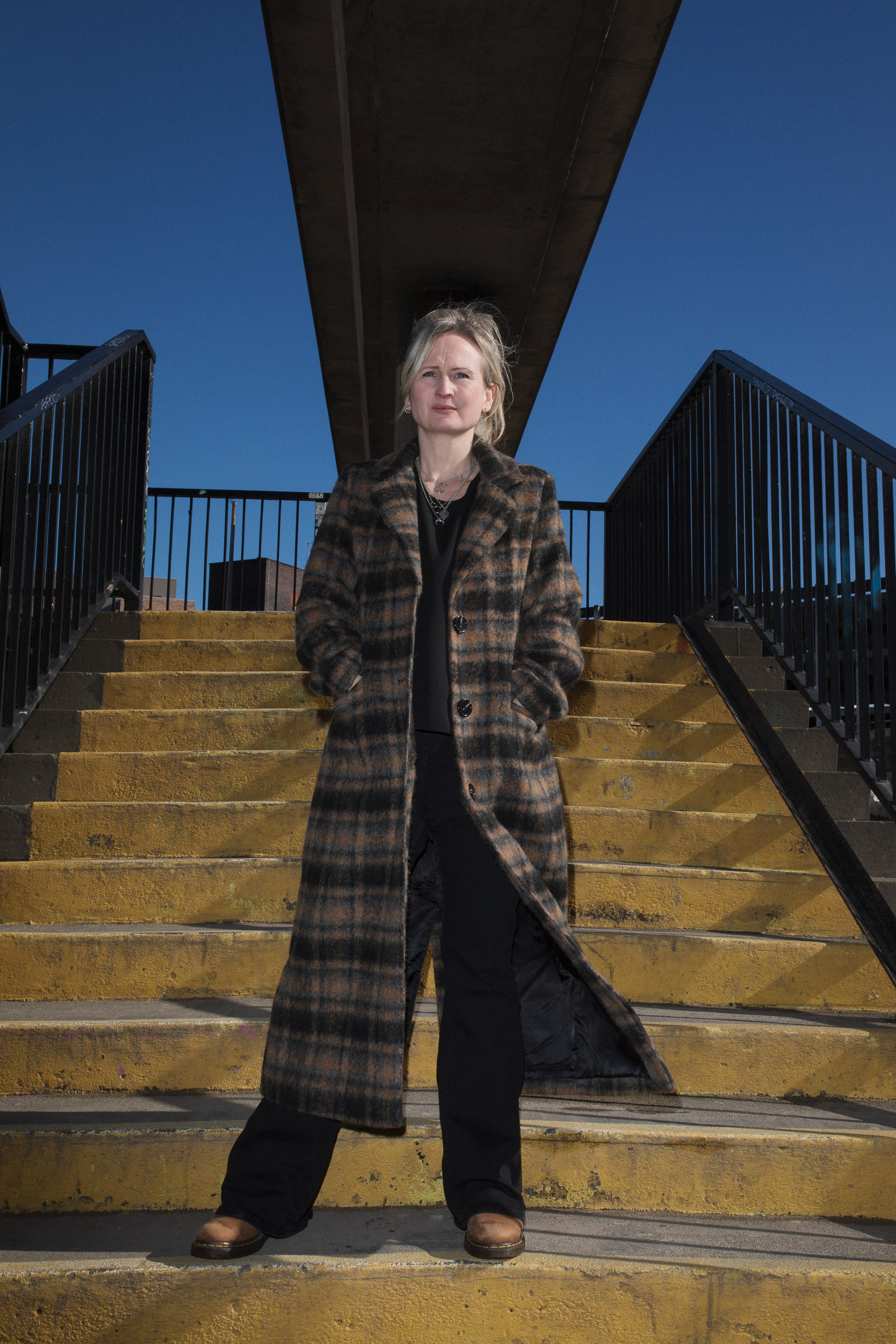Lucy Nichol
The unapologetic writer
Interview by Alison Cowie
Photographs by Christopher Owens
Lucy Nichol has spent her career providing PR and copywriting for a variety of organisations that provide societal good. She is also a prolific blogger, freelance writer and has authored five books exploring the themes of mental health, addiction and her love of 90s music. Lucy puts her laptop down momentarily to reveal what compels her to write and why there’ll always be more pages to fill.
In Lucy Nichol’s forthcoming book, No Worries If Not, she explores women’s habitual need to keep apologising.
“We say sorry for everything,” she explains. “I had a friend the other day who apologised for inviting me to go out with them. She asked me to do something lovely and was saying sorry for doing so.
“We’re almost apologising for existing. I remember sitting in business meetings saying, ‘sorry if this is a bit stupid, but maybe we could do this…’. My boss would say, ‘Lucy, that was a good idea. Why are you apologising?’”
No Worries if Not – a romantic comedy that’s also described as a love letter to Newcastle, where its creator has been based for the past 16 years, is Lucy’s fifth book, and she is finally getting more comfortable accepting her author title.
“Sometimes I feel like I have to apologise because I’m not Matt Haig or Joanne Harris,” she reflects. “It’s easier to go, ‘well, I'm trying to be a writer’.
“But I've got five books out. Of course I'm a bloody author!”
Lucy balances her authoring with a range of copywriting and public relations services provided to clients through Lucy Nichol PR.
Her foray into this world began in Hull, where she moved as a 17-year-old and worked in the university’s students union bar before moving to a recruitment consultancy.
“I wanted something more creative, and then I saw a job as a press officer for Hull Truck Theatre.
“I knew I loved writing and so I applied. Despite having no experience, I somehow landed the job and I absolutely loved it.”
Lucy completed her CIPR Advanced Certificate in Public Relations while working at the independent theatre company, and moved to the North East after falling for a Geordie actor.
She worked in PR and marketing communications roles at Middlesbrough Council Cultural Services, Northumbria University, Derwentside Trust for Sport and the Arts,Home Group and NGI. She launched her own freelance PR business in 2010, which became her full time career in 2020, and has since worked with a wide variety of companies, charities and arts institutions.
Something that has informed her PR and copywriting work is a desire to work with organisations that deliver societal good.
“I like to make sure that my time goes towards something that can make a difference,” Lucy adds.
Alongside her PR work, the 44-year-old has been a prolific blogger and journalist on the subject of mental health.
Originally from Hinckley in Leicestershire, Lucy describes herself as “painfully shy and socially awkward” growing up. She began experiencing anxiety as a teenager that eventually manifested into panic attacks.
In the 1990s, there was less understanding and acceptance around mental health, which led to a delay in Lucy accepting she had an anxiety disorder.
“I was always an anxious person and thought that was normal,” she reveals. “Then I found myself crawling along Princes Avenue in Hull, retching and almost blacking out because I was having a panic attack aged 15. Not that I knew what it was at the time.
“Then, when I was 19 and I remember ringing the doctors, crying on the phone. I thought something was physically wrong with me because it felt like my throat was closing up. I was so frightened.
“It was the doctor who said he thought it was anxiety.”
Lucy, who manages her mental health with medication and therapy, has drawn on her experiences to write regular blogs and articles about mental health. She has also worked with several related charities, including Time to Change and Student Minds.
It was through her work with Time to Change that she met Jenni Regan, who at the time worked as head of the media advisory service at Mind.
Knowing Lucy’s background in mental health communications and in the theatre, Jenni asked if she would be interested in becoming a TV script adviser for the charity.
“Jenni was a former journalist and had set up the media advisory desk at Mind to review television and film scripts to ensure they were accurate and not stigmatising towards mental health.”
“Sometimes I feel like I have to apologise because I’m not Matt Haig or Joanne Harris. But I've got five books out. Of course I'm a bloody author!”
Lucy spent two years working with Eastenders, Coronation Street, Hollyoaks, Casualty, Holby City and others to ensure mental health depictions were true to life.
“There were some things you could see from a first read,” Lucy reflects. “It might be somebody with psychosis was scrawling on a wall. I would say that there might be people who have had a psychotic break and have written on a wall at some point. However, I haven't heard of anyone doing it and it makes people think of a horror film which isn’t helpful.
“It was also picking up on how characters were introduced into a long-running show. They often came in presenting with a mental health problem and then left. That's not helpful because you’re seeing the illness, not the person.”
Lucy highlights Coronation Street’s 2019 storyline around Carla Connor experiencing psychosis as a particularly authentic portrayal.
“Carla was an assertive character and a strong businesswoman. But her psychotic episode showed her in a very vulnerable light, which was so refreshing.
“Too often psychosis equals danger on screen, which gives the wrong impression.”
When Lucy was commissioned to write an article, A Series of Unfortunate Stereotypes, for comedian Sarah Millican’s digital magazine, Standard Issue, it was to prove the catalyst for her first book.
A Series of Unfortunate Stereotypes: Naming and Shaming Mental Health Stigma was published in 2018 by Trigger and looked to debunk misconceptions that had formed around mental health.
“I wanted to explain why someone with anxiety could always be on the dance floor and happy in front of a camera? Or why someone in the military, who was proper hardcore, could succumb to crippling addiction?” Lucy explains.
“I wanted to show it doesn't make you weak because you have a mental health problem or it doesn’t make you fearful of the world because you have an anxiety disorder.”
Lucy’s follow-up, ((Don’t Call Me) Snowflake: Breaking Through Mental Health Stereotypes and Stigma was published by Welbeck Balance in January 2023.
In it, she again takes common stereotypes and breaks them down, using her experiences and comments from experts in the profession.
“I was always an anxious person and thought that was normal. Then I found myself crawling along Princes Avenue in Hull, retching and almost blacking out.”


While Lucy acknowledges there has been some progress in attitudes and awareness around mental health in the intervening five years, there is still a lot of stigmas that need addressing.
“Some of the stereotypes are based around language and confusing words,” the writer, who is currently working with Action of Postpartum Psychosis, explains. “You often see ‘psychosis’ and ‘psychopathic’ mixed up, but the two are completely different.
“A psychopath is somebody who lacks empathy and can be cold and calculating. Someone with psychosis is confused and very vulnerable.”
Lucy finds disparaging opinions around mental health problems from the likes of Piers Morgan and Katie Hopkins as potentially dangerous, and she wants the media to take more responsibility for the negative impacts such views can have.
She also found the reaction to Meghan Markle’s disclosure of suicidal thoughts particularly troubling.
“The CEO of a mental health charity used the word ‘victimhood’, which disgusted me,” Lucy says.
“It gives the impression that a person can't say they feel suicidal because they'll be accused of attention seeking. What risk can that have on people's lives?”
Between A Series of Unfortunate Stereotypes and Snowflake, Lucy self-published two novels that further explored mental health, addiction and another interest of hers – 90s music.
“I got my love of the arts from my dad, who was very into his music.
“I was obsessed with 90s music and a few years ago I got into reminiscing about it and listening to my favourite bands such as Babes in Toyland and Senseless Things, who I adored at the time.”
“It was picking up on how characters were introduced into a long-running show. They often came in presenting with a mental health problem and then left. That's not helpful because you’re seeing the illness, not the person.”
Lucy’s first novel, The Twenty Seven Club, focused on the morbid phenomenon where musicians such as Jimi Hendrix, Janis Joplin, Kurt Cobain and Amy Whitehouse have all died aged 27.
Set within Hull and 90s culture, it follows the life of Emma who, on the eve of her 27th birthday, becomes obsessed with the macabre club and uses it as a way to identify and work through her own mental health problems.
“There’s so much attention around the members of the so-called ‘27 club’,” Lucy reflects. “But there's always mental health problems, trauma and often issues with drugs and alcohol involved. I wanted to show that, as fans or as readers of newspapers, we don't know these people so we shouldn’t judge or glamorise their deaths.”
Lucy followed her debut novel up with Parklife – a nod to the 90s Blur song – which again features Emma, who has lost her job and is serving ice cream in a park where she meets a man living on a bench.
“She assumes he’s a homeless drunk, and so it’s playing into that perception,” she explains. “We often make assumptions about the ‘homeless alcoholic living on a park bench’ but they're not usually right. Addiction is so misunderstood and we have to look deeper.”


“By the time I've written the first draft of something, I feel like I’ve exhausted it. Then [my editor] will say, ‘can we have a bit more about the love interest Greg here or more about Newcastle here?’ It’s like getting permission to dive back into certain areas and it reignites the spark.”
Lucy, who has worked with Road to Recovery Trust (for whom she was a trustee) and Recovery Connections, was able to consult with experts to ensure her portrayal of addiction was accurate.
“I was also able to commission people in recovery to read the book to make sure the things I had written were authentic,” she adds.
While her first two novels were self-published, they were by no means solo projects, as Lucy speaks of a large team that helped bring her novels to fruition.
“I worked with typesetters, designers, animators, Facebook and Tik Tok consultants and editors. My copy editor would say to me things like, ‘Emma hasn’t mentioned the dog for four chapters and I'm really worried about it’ so I would have to go back and look at that.”
On the back of her self-published works, Lucy now has a literary agent and a book deal from HarperCollins, which commissioned No Worries If Not.
The author again relishes the collaboration to get her stories on the bookshop shelves.
“I love getting feedback from the editor. It spurs me on. By the time I've written the first draft of something, I feel like I’ve exhausted it. Then she’ll say ‘Can we have a bit more about the love interest Greg? Or a bit more about Newcastle here?’
“It’s like getting permission to dive back into certain areas and it reignites the spark.”
While Lucy knows the benefits of coverage in the likes of Stylist, Woman’s Own or Louder Than War, she takes most pleasure from finding out about individuals who have read, enjoyed and gained from her books.
“I got an amazing Tweet from somebody the other day who's a year into his recovery and said my books helped a lot.
“I also found out a member of Senseless Things read and loved The Twenty Seven Club, which indulged my inner fan girl!”
Similarly, Lucy got great pleasure from seeing one of her stories performed on stage at Newcastle’s Live Theatre after her husband, Chris Connel, wrote a stageplay for The Twenty Seven Club.
“It was great because I had 300 pages to get this complex story across whereas he had an hour on stage. He took the narrative from the book and created new scenes and put the characters in new situations. It was magical to watch.”
Lucy says she doesn’t have a ‘typical writing day’, and instead manages her authoring around her PR clients. However, she reveals she’s already completed a sixth book and is working with her literacy agent, Jo on new ideas.
Lucy also divulges that her Jo once asked what her future aspiration was, and she described herself living-in-the-sticks with a goat in a paddock, and as a full-time author.
“I’d get a hell of a lot of books out because I can’t stop writing!”







